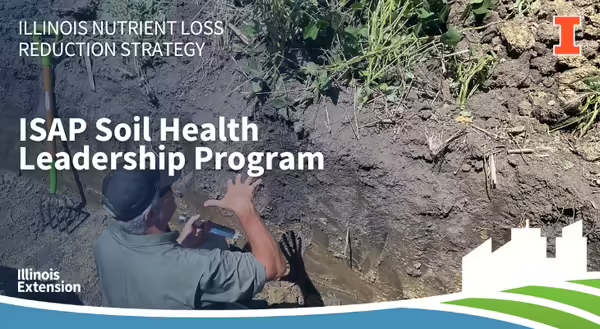
Soil health is a vital component for productive fields, but it is a complex topic. The Illinois Sustainable Ag Partnership (ISAP) has created the Soil Health Leadership Program (SHLP) to help farmers, ag advisors, and conservation professionals become content experts and provide the confidence to help others improve their soil health. Helen VanBeck is a Program Manager on American Farmland Trust’s Midwest Team and Manager of ISAP, Megan Baskerville serves as Illinois’ Agriculture Program Director for The Nature Conservancy and ISAP’s Vice President, and Brandon Hall is the location operation manager for West Central FS in Wataga and a recent graduate of the training talk about the SHLP in Episode 62 of the NLRS podcast.
What is ISAP?
ISAP began in 2017 in response to the Illinois Nutrient Loss Reduction Strategy (NLRS) through conversations by organizations interested in how Illinois as a state and specifically agriculture could work together to address and meet the goals outlined in the NLRS. ISAP has grown and become a non-profit organization with 15 member organizations supporting the agriculture sector’s progress towards reaching the Strategy’s goals. ISAP has developed multiple resources and programs to support farmers, ag advisors, and conservation professionals to help bridge the information gap, which include:
-
Conservation Story Map – features farmer profiles, service providers, those who have gone through ISAP trainings, and demonstration sites
-
Illinois On-Farm Cover Crop Network (ICCON) monthly calls
VanBeck explained that ISAP has adopted a train-the-trainer model, understanding we will need a lot of people across the state (farmers and advisors) who are well-equipped to implement conservation practices outlined in the Strategy and to help their neighbors, customers, and other farmers they are working with to also adopt conservation practices, like the Soil Health Leadership Program.
Soil Health Leadership Program
The Soil Health Leadership Program, formerly known as the Advanced Soil Health Training, is 6-part training over 18 months across Illinois. Each training is typically a day and a half including classroom learning and in-field training. The SHLP is designed for people who are already in the field advising on row crops in Illinois, or managing row crops themselves. Baskerville explained that participants learn about the science and principles of soil health along with practical production changes needed to maximize the on-farm benefits of these practices. Participants are encouraged to learn from each other and those leading the training.
Baskerville highlights that some of the dates for the SHLP have already been set. The times chosen are intended to work for farmers and farm advisors without interfering with the busy times of planting and harvesting.
Participant Perspective
Brandon Hall is a recent graduate of the program and the 2023 Illinois Certified Crop Advisor (CCA) award winner. Hall highlights the value and confidence he gained from going through the training. He acknowledged that it was a challenge to make the time to attend the training, but he said it was always well worth the time. Each session provided valuable information with on-site training with experienced producers who gave first-hand information and discussed lessons learned.
Hall said that the training provided him with the confidence to have tough conversations about management practices with producers. For many producers, field management style is engrained, so change is difficult. Hall now has the information and is prepared to answer the questions coming to him from farmers based on carbon credits and other topics related to soil health. He is also getting out in the community to educate community members and students about soil health and why it is important for the future of agriculture.
To learn more about ISAP and the SHLP, check out ISAP’s website. To listen to the full interviews with Helen, Megan, and Brandon visit the NLRS Podcast Episode 62: ISAP Soil Health Leadership Program.
About the authors
Rachel Curry is an Agriculture and Agribusiness Educator focusing on agriculture and watershed education and is a part of the Illinois Extension's Nutrient Loss Reduction Strategy implementation team. Rachel earned a B.A. in Environmental Studies from Knox College and an M.S. in Environmental Science and Soil Science from Iowa State University with an emphasis on soil fertility. Her work focuses on education and outreach regarding the Illinois Nutrient Loss Reduction Strategy and agricultural conservation practices to reduce nutrient loss and improve water quality and soil health throughout Illinois.
Nicole Haverback is a Watershed Outreach Associate and is a part of the Illinois Extension's Nutrient Loss Reduction Strategy implementation team. Nicole earned a B.S. in Agriculture and Rural Policy Studies from Iowa State University. She coordinates watershed and planning activities to reduce nutrient losses from priority watersheds, provides expertise on best management practices for nutrient loss, and conducts outreach on agricultural conservation practices outlined in the Illinois Nutrient Loss Reduction Strategy.
Emma Eldridge is a Watershed Outreach Associate and part of the Illinois Extension Nutrient Loss Reduction Strategy implementation team, serving the Little Wabash and Embarras watersheds, designated as phosphorus-priority watersheds in the NLRS. Emma earned a B.A. in Environmental Studies from McKendree University and an M.S. in Forestry from Southern Illinois University Carbondale. She coordinates watershed and planning activities to reduce phosphorus losses from identified priority watersheds, provides expertise on best management practices, and conducts outreach on agricultural conservation practices outlined in the Illinois Nutrient Loss Reduction Strategy.
About the blog
At Illinois Extension, we’re working to improve water quality at home and downstream. Every month, our Watershed Outreach Associates will bring you stories highlighting agricultural conservation practices, current research projects and results, and from the field farmer interviews. The Nutrient Loss Reduction blog covers conservation practices recommended by the Illinois Nutrient Loss Reduction Strategy, timely updates, farm safety, and new decision tools to help farmers and producers reduce the nutrients leaving their field. Want to get notified when new blog posts are available? Subscribe at go.illinois.edu/SubscribeINLRS.